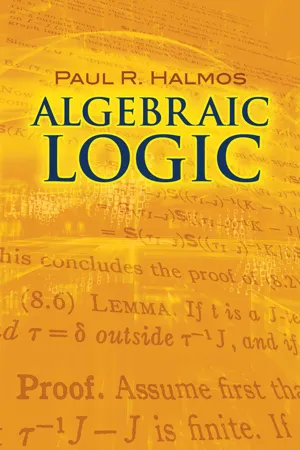
- 272 pages
- English
- ePUB (mobile friendly)
- Available on iOS & Android
eBook - ePub
Algebraic Logic
About this book
Beginning with an introduction to the concepts of algebraic logic, this concise volume features ten articles by a prominent mathematician that originally appeared in journals from 1954 to 1959. Covering monadic and polyadic algebras, these articles are essentially self-contained and accessible to a general mathematical audience, requiring no specialized knowledge of algebra or logic.
Part One addresses monadic algebras, with articles on general theory, representation, and freedom. Part Two explores polyadic algebras, progressing from general theory and terms to equality. Part Three offers three items on polyadic Boolean algebras, including a survey of predicates, terms, operations, and equality. The book concludes with an additional bibliography and index.
Part One addresses monadic algebras, with articles on general theory, representation, and freedom. Part Two explores polyadic algebras, progressing from general theory and terms to equality. Part Three offers three items on polyadic Boolean algebras, including a survey of predicates, terms, operations, and equality. The book concludes with an additional bibliography and index.
Tools to learn more effectively

Saving Books

Keyword Search

Annotating Text

Listen to it instead
Information
V
GENERAL THEORY
Algebraic logic (II)
Homogeneous locally finite polyadic Boolean algebras of infinite degree
Table of contents
Introduction,
§1.Monadic algebras,
§2.Functional polyadic algebras,
§3.Substitutions,
§4.Polyadic algebras,
§5.Locally finite algebras,
§6.Supports and independence,
§7.Quasi-polyadic algebras,
§8.Algebraic theory,
§9.Logics,
§10.Functional representation,
§11.Dilations,
§12.Constants,
§13.Factorization and commutativity,
§14.Constants from endomorpbisms,
§15.Examples of constants,
§16.Rich algebras,
§17.Representation,
Appendix,
Introduction
The purpose of this paper is to do for the lower functional calculus what the first paper of the series did for the monadic special case. To a very great extent, however, the two papers are independent of each other. The situation is similar to that in the theory of differential equations. Once the basic but relatively elementary concept of differentiation is known, it can be used to give a mathematical formulation of the problems of classical Newtonian mechanics, usually in the form of ordinary differential equations. It can also be used to give a mathematical formulation to some of the more sophisticated problems of modern physics, usually in the form of partial differential equations. Similarly, once the algebraic version of the logical operation of quantification is defined, it can be applied to the algebraic study of either classical or modern logic. The analogy is quite close. Traditional Aristotelean logic can be viewed as the theory of propositional functions of a single variable; the lower functional calculus, on the other hand, treats propositional functions of any number of variables.
The analogy between physics and logic can be used to illuminate not only the role of this paper in the series, but, for that matter, the purpose of algebraic logic as a whole. It is fashionable nowadays to give a mathematical exposition of quantum mechanics in terms of certain algebraic systems. The concepts occurring in such an exposition, the terms used to describe them, and the problems selected for special emphasis are all suggested by the facts of physics. The algebra does not pretend to solve physical problems or to give new information about the state of the universe; its primary aim is to study a mathematical subject by mathematical methods. The mathematic...
Table of contents
- Cover
- Title page
- Copyright
- Contents
- Preface: Being a Letter from Sir William Betford, of Bampton St. Mary, in Dorsetshire, to George Trevelyan; of Lincoln’s Inn Fields, London
- I. Introduction
- II. General Theory
- III. Representation
- IV. Freedom
- V. General Theory
- VI. Terms
- VII. Equality
- VIII. General Theory
- IX. Terms and Equality
- X. Brief Summary
- Additional Bibliography
- Index
Frequently asked questions
Yes, you can cancel anytime from the Subscription tab in your account settings on the Perlego website. Your subscription will stay active until the end of your current billing period. Learn how to cancel your subscription
No, books cannot be downloaded as external files, such as PDFs, for use outside of Perlego. However, you can download books within the Perlego app for offline reading on mobile or tablet. Learn how to download books offline
Perlego offers two plans: Essential and Complete
- Essential is ideal for learners and professionals who enjoy exploring a wide range of subjects. Access the Essential Library with 800,000+ trusted titles and best-sellers across business, personal growth, and the humanities. Includes unlimited reading time and Standard Read Aloud voice.
- Complete: Perfect for advanced learners and researchers needing full, unrestricted access. Unlock 1.4M+ books across hundreds of subjects, including academic and specialized titles. The Complete Plan also includes advanced features like Premium Read Aloud and Research Assistant.
We are an online textbook subscription service, where you can get access to an entire online library for less than the price of a single book per month. With over 1 million books across 990+ topics, we’ve got you covered! Learn about our mission
Look out for the read-aloud symbol on your next book to see if you can listen to it. The read-aloud tool reads text aloud for you, highlighting the text as it is being read. You can pause it, speed it up and slow it down. Learn more about Read Aloud
Yes! You can use the Perlego app on both iOS and Android devices to read anytime, anywhere — even offline. Perfect for commutes or when you’re on the go.
Please note we cannot support devices running on iOS 13 and Android 7 or earlier. Learn more about using the app
Please note we cannot support devices running on iOS 13 and Android 7 or earlier. Learn more about using the app
Yes, you can access Algebraic Logic by Paul R. Halmos in PDF and/or ePUB format, as well as other popular books in Mathematics & Algebra. We have over one million books available in our catalogue for you to explore.